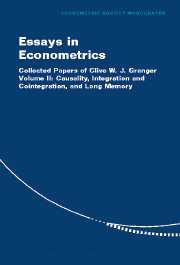Book contents
- Frontmatter
- Contents
- Acknowledgments
- List of Contributors
- Introduction
- PART ONE CAUSALITY
- 1 Investigating Causal Relations by Econometric Models and Cross-Spectral Methods
- 2 Testing for Causality: A Personal Viewpoint
- 3 Some Recent Developments in a Concept of Causality
- 4 Advertising and Aggregate Consumption: An Analysis of Causality
- PART TWO INTEGRATION AND COINTEGRATION
- PART THREE LONG MEMORY
- Index
2 - Testing for Causality: A Personal Viewpoint
Published online by Cambridge University Press: 06 July 2010
- Frontmatter
- Contents
- Acknowledgments
- List of Contributors
- Introduction
- PART ONE CAUSALITY
- 1 Investigating Causal Relations by Econometric Models and Cross-Spectral Methods
- 2 Testing for Causality: A Personal Viewpoint
- 3 Some Recent Developments in a Concept of Causality
- 4 Advertising and Aggregate Consumption: An Analysis of Causality
- PART TWO INTEGRATION AND COINTEGRATION
- PART THREE LONG MEMORY
- Index
Summary
A general definition of causality is introduced and then specialized to become operational. By considering simple examples a number of advantages, and also difficulties, with the definition are discussed. Tests based on the definitions are then considered and the use of post-sample data emphasized, rather than relying on the same data to fit a model and use it to test causality. It is suggested that a bayesian viewpoint should be taken in interpreting the results of these tests. Finally, the results of a study relating advertising and consumption are briefly presented.
THE PROBLEM AND A DEFINITION
Most statisticians meet the concept of causality early in their careers as, when discussing the interpretation of a correlation coefficient or a regression, most textbooks warn that an observed relationship does not allow one to say anything about causation between the variables. Of course this warning has much to recommend it, but consider the following special situation: Suppose that X and Y are the only two random variables in the universe and that a strong correlation is observed between them. Further suppose that God, or an acceptable substitute, tells one that X does not cause Y, leaving open the possibility of Y causing X. In the circumstances, the strong observed correlation might lead to acceptance of the proposition that Y does cause X. This possibility occurs because of the extra structure imposed on the situation by the knowledge that X does not cause Y.
- Type
- Chapter
- Information
- Essays in EconometricsCollected Papers of Clive W. J. Granger, pp. 48 - 70Publisher: Cambridge University PressPrint publication year: 2001
- 3
- Cited by

